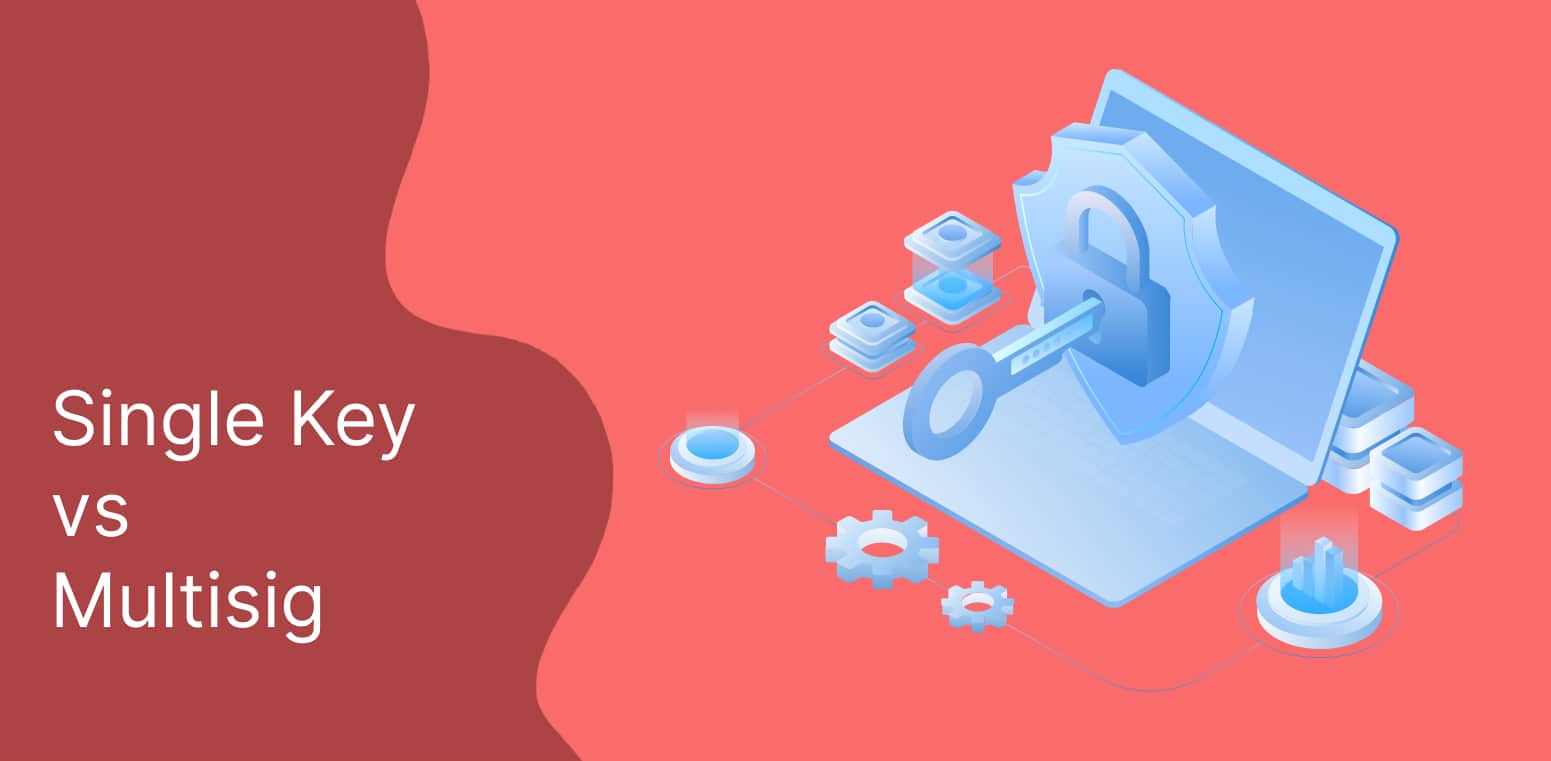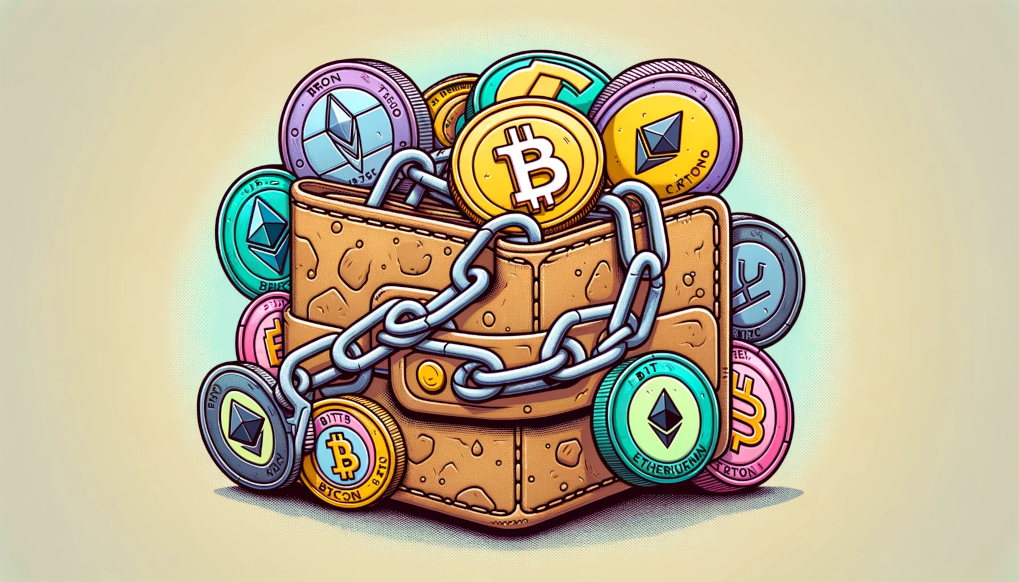All About Multisig VS Single Key Crypto Wallets

A fundamental part of any blockchain ecosystem, including cryptocurrencies like Bitcoin or Ethereum, is the concept of a "wallet". These digital wallets don't hold money in the conventional sense; instead, they store cryptographic keys - single key or multisig (multi-signature) keys, that allow users to send or receive cryptocurrency on a blockchain network.
Let's dive in to discuss these two options, outlining their advantages and disadvantages to provide a comprehensive understanding.
Single Key Wallets
A single key wallet is a type of cryptocurrency wallet where access and control are managed through one private key held solely by the user. This private key acts like a password, granting the user full control over the wallet's contents, such as sending, receiving, and managing digital assets. Because there's only one key involved, it's straightforward to use and set up is ideal for beginners or those managing smaller amounts of crypto. However, it also means that the security of the wallet depends entirely on the safety of that single private key. If the key is lost, forgotten, or stolen, the user may permanently lose access to their funds.
While single key wallets offer simplicity, they also come with notable risks. Since only one key controls the wallet, there's no built-in redundancy or multi-layered protection.
Advantages of Single Key Wallets
- Single key wallets are easy to set up and use, making them ideal for beginners in the blockchain space.
- Users have total control over their funds, as only one private key is required to access and manage them.
- Transactions can be made quickly without needing multiple signatures.
Disadvantages of Single Key Wallets
- The single key becomes a single point of failure. If it is lost or stolen, the entire wallet can be compromised, potentially resulting in a total loss of funds.
- There is no backup option if the private key is lost. Even if a user has the public key (address), without the corresponding private key, the funds are inaccessible.
- Total control also places complete responsibility on the user. Mistakes or negligence can lead to irreversible consequences.
Multisig Wallets
Multisig wallets, or multi-signature wallets, are a more advanced form of blockchain wallets. These wallets require multiple private keys to authorize a blockchain transaction. A multisig wallet will have a predefined condition, for example, 2-of-3, 2-of-3 or 3-of-5, where two out of two, two out of three, or three out of five private keys, respectively, are required to sign and approve a transaction.
Multi-signature wallets are more secure and are suitable for group transactions control. There are not so many options out there in the market. Our wallet - TotalSig unique because it combines multi-signature technology with Multi-party computation (MPC) for an added layer of security and flexibility. This hybrid approach eliminates single points of failure while still offering the familiar benefits of traditional multisig.
Multisig wallets have become especially popular for storing major cryptocurrencies like Bitcoin, Ethereum, and Tron, due to their enhanced security and shared control features. A Bitcoin multisig wallet allows multiple parties to jointly manage BTC funds, which is ideal for organizations, joint accounts, or treasury management. Similarly, an Ethereum multisig wallet is commonly used in decentralized applications (dApps), DAOs, and DeFi platforms, where transparent and secure fund governance is essential. These wallets reduce the risk of theft or accidental loss, since no single individual can unilaterally move funds without the required number of approvals.
In the case of Tron, a Tron multisig wallet offers similar benefits, particularly for projects building on the TRON network or managing TRX and TRC-20 tokens. Tron multisig functionality allows teams or organizations to implement role-based permissions and transaction approval processes, adding an extra layer of protection.
Advantages of Multisig Wallets
- Since multiple keys are required, multisig wallets are more secure against theft. Even if a malicious party obtains one key, they can't access the funds without the other keys.
- Multisig wallets are ideal for organizations or groups where joint control of funds is required. This setup can enforce a system of checks and balances.
- If one key is lost, the wallet is not lost. The other keys can still access the funds, offering a built-in redundancy mechanism.
Disadvantages of Multisig Wallets
- Setting up and managing a multisig wallet is more complex than a single key wallet, which may deter beginners or non-tech-savvy users.
- Transactions require signatures from multiple parties, which can slow down the process, especially if parties are in different time zones or unavailable.
- In a multi-person scenario, disagreements can stall transactions or make the funds inaccessible.
What are the best options?
There's a considerable variety of options depending on the specific needs, technical proficiency, and security considerations.
Paper Wallets:
That's perhaps the most old-school method for storing cryptocurrencies. Paper wallets involve printing out your private keys on a piece of paper and storing it in a safe place. This method is incredibly secure against online attacks because the keys are never online, but it does make it vulnerable to physical damage or loss.
Hardware Wallets:
hese are physical devices that securely store private keys offline. They are typically immune to virus attacks and are portable. Some popular hardware wallets include Ledger, Trezor, and KeepKey. By keeping the private keys isolated from internet-connected devices, hardware wallets significantly reduce the risk of hacking, phishing, or malware exposure. Even when connected to a compromised computer, the keys remain protected, as transactions must be physically confirmed on the device itself.
Hardware wallets are often considered one of the safest methods for long-term crypto storage, especially for users holding significant amounts of cryptocurrency. They support a wide range of digital assets and integrate with many wallet applications, allowing users to manage their funds while keeping their keys offline. While they come at a cost, the added security and peace of mind make them a worthwhile investment for serious investors.
Software Wallets:
Software wallets are programs that can be installed on a computer or mobile device. They generate the keys on the device itself and store them locally. There are also online software wallets, where the keys are stored on a server. We can recommend our own TotalSig, but other names out there include Guarda wallet, Exodus wallet (Good for beginners), Electrum, and Mycelium (Mobile Bitcoin wallet).
Custodial Wallets:
In this case, a third party, usually a cryptocurrency exchange or a bank, holds the keys. The user doesn't control the private keys directly. This option offers ease of use, but there's the risk of third-party failures.
Multi-signature Wallets:
As explained earlier, these require more than one private key to authorize a transaction. This offers additional security and is especially useful for businesses or large transactions. However, despite their advantages, there are unfortunately not many multisig wallet options available on the market. Supporting multisignature functionality requires significant technical resources and infrastructure from wallet providers, while generating relatively little direct revenue. As a result, many providers deprioritize or even abandon multisig support altogether, leaving users with limited and often fragmented solutions.
That said, there are some standout options - TotalSig is one such platform that focuses purely on delivering an exceptional multisig experience. Unlike other multisig wallet providers, TotalSig offers a unified multisig interface that allows users to manage all their assets across multiple popular blockchains including Bitcoin, Ethereum, and Tron - from a single, convenient app. TotalSig simplifies complex multisig setups and streamlines transaction approvals, making advanced security features accessible even to non-technical users. It's built for those who need serious security without compromising on usability.
Smart Contract Wallets:
These are more advanced types of wallets, where conditions can be programmed into the wallet itself. For example, daily withdrawal limits can be set, or a transaction could require approval from another account before it can be processed. This gets fancy here with all the options at hand and this resource can share over 30 different smart contract wallets.
What are your needs?
The best method for a user depends on their individual needs. Those who prioritize security and do not require frequent access to their funds might opt for hardware or paper wallets. Those who are transacting regularly might prefer the convenience of a software wallet. Multisig wallets can provide enhanced security and are beneficial for organizations or for individuals storing large amounts of cryptocurrency. Lastly, advanced users might explore smart contract or HD wallets, as they offer a high degree of flexibility and control.
Regardless of the type of wallet you chose, it's important to secure and manage the private keys responsibly. Remember that the strength of blockchain technology lies in decentralization, and the only way to access its benefits is with your keys.


